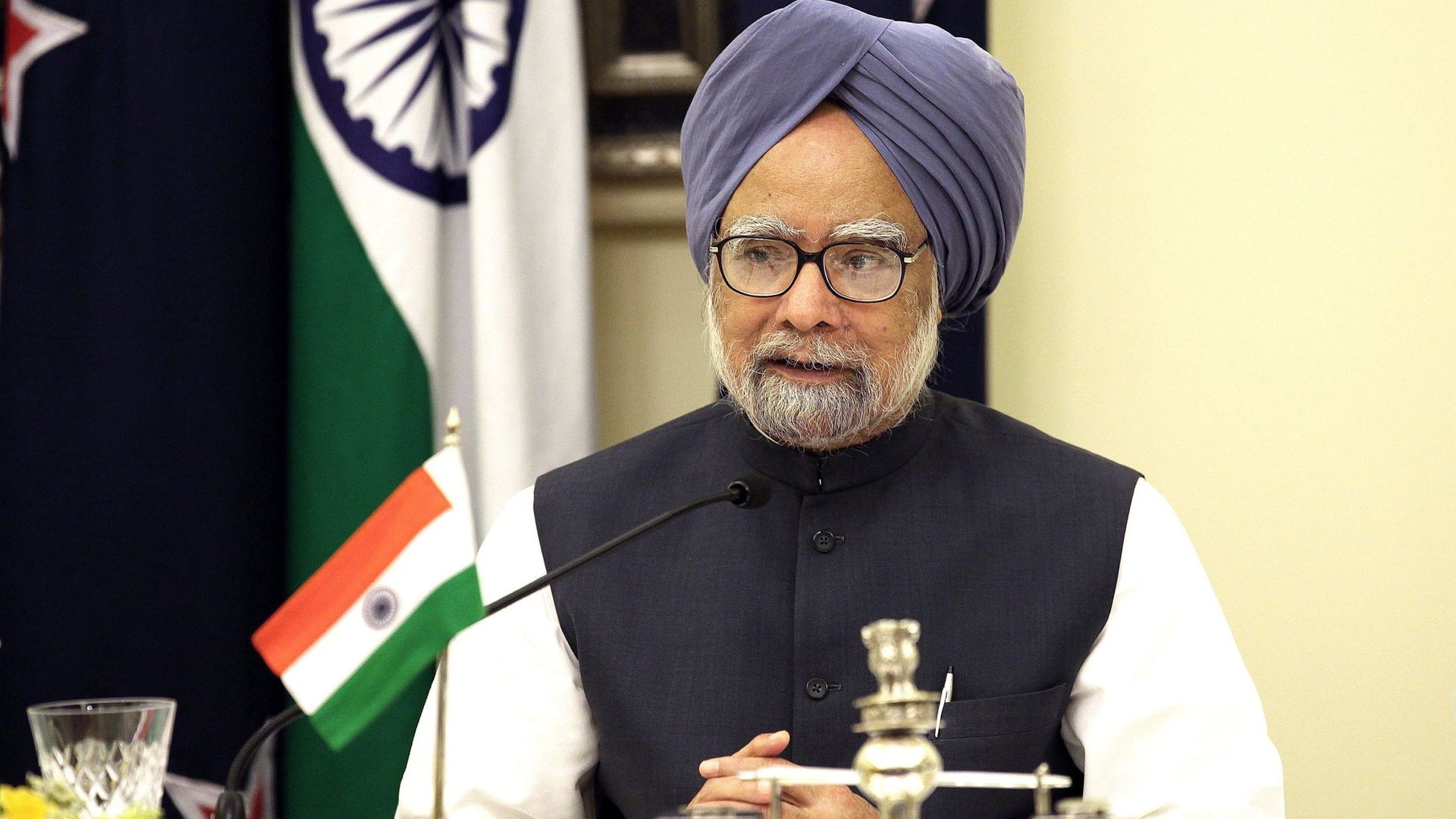尊敬的用户您好,这是来自FT中文网的温馨提示:如您对更多FT中文网的内容感兴趣,请在苹果应用商店或谷歌应用市场搜索“FT中文网”,下载FT中文网的官方应用。


India’s former prime minister Manmohan Singh, who died aged 92 on Thursday, launched a transformative liberalisation of the state-controlled economy during a 1991 currency crisis, putting the country on a long-term trajectory of faster growth and rising global influence.
印度前总理曼莫汉•辛格(Manmohan Singh)于周四去世,享年92岁。在1991年的货币危机期间,他启动了对国家控制经济的变革性自由化改革,使印度走上了长期快速增长和全球影响力提升的轨道。
As finance minister from 1991 until 1996, Singh overcame entrenched political resistance to end decades of isolation and stagnation, open India’s doors to greater foreign trade and private investment, and begin its integration into the global economy.
从1991年到1996年担任财政部长期间,辛格克服了根深蒂固的政治阻力,结束了数十年的孤立和停滞,为印度打开了更多对外贸易和私人投资的大门,并开始融入全球经济。
The Oxford-trained economist, known for his mild, self-effacing manner and personal integrity, was subsequently tapped by Sonia Gandhi, the Italian-born Congress party leader, to serve as premier after the party’s shock electoral victory in 2004.
这位在牛津大学受训的经济学家以温和、谦逊的态度和个人诚信著称。在2004年国大党意外赢得选举后,他被意大利出生的国大党领袖索尼娅•甘地(Sonia Gandhi)选中担任总理。
Singh was considered by Gandhi a safe, technocratic choice to lead India, who would not emerge as a political rival to her or her young son, Rahul, whom she was grooming to eventually take over the party leadership.
甘地认为辛格是一个安全的技术官僚人选来领导印度,他不会成为她或她年轻的儿子拉胡尔的政治对手,而她正在培养拉胡尔最终接管党的领导。
During his premiership, Singh’s hope of continuing India’s economic reforms was thwarted by Congress’s coalition partners, which objected to many of the measures he wished to pursue.
在辛格担任总理期间,他希望继续推进印度的经济改革,但国大党的联盟伙伴反对他想推行的许多措施,阻碍了他的计划。
His second term in office from 2009 was seen as opportunity to press ahead with more dramatic reforms. But he ended up weak and isolated within his party as high-profile corruption scandals plagued his administration.
他从2009年开始的第二个任期被视为推进更大规模改革的契机。但由于备受瞩目的腐败丑闻困扰着他的政府,他最终在党内变得软弱无力,孤立无援。
Born in 1932 in a rural village in what is today part of Pakistan, Singh, a member of the Sikh faith, migrated to India when British-ruled India was divided into Hindu-majority India and Muslim-majority Pakistan.
辛格于1932年出生在一个如今属于巴基斯坦的农村村庄。作为锡克教徒,在英属印度被分为印度教占多数的印度和穆斯林占多数的巴基斯坦时,他迁移到了印度。
He attended university in India, then obtained a degree from Cambridge and a PhD in economics from Oxford, writing a thesis and book entitled “India’s Export Trends and Prospects for Sustained Growth”.
他在印度上大学,然后获得剑桥的学位,并在牛津大学获得经济学博士学位,撰写了一篇题为《印度的出口趋势及持续增长前景》的论文和书籍。
It challenged India’s then pervasive export pessimism that was to blight its development for a further three decades. Singh subsequently worked for several years at the United Nations Conference on Trade and Development.
这对当时印度普遍存在的出口悲观情绪提出了挑战,这种情绪在接下来的三十年中继续阻碍其发展。随后,辛格在联合国贸易和发展会议工作了数年。
In 1969, he returned to India to teach economics. Then in 1971, Singh took up a post as economic adviser in the commerce ministry, the start of a long career in government service in which he held many top posts, including governor of the Reserve Bank of India.
1969年,他回到印度教授经济学。1971年,辛格在商务部担任经济顾问,开启了他在政府服务中的漫长职业生涯,期间他担任了许多高级职位,包括印度储备银行(Reserve Bank of India)行长。
But his fundamental role in transforming India came in 1991, as it was facing a severe foreign exchange crisis, which had forced the country to fly some of its gold reserves abroad as security for an IMF rescue loan.
但他在1991年对印度转型的根本作用显现出来,当时印度正面临严重的外汇危机,这迫使该国将部分黄金储备运往国外,作为国际货币基金组织(IMF)救助贷款的担保。
Singh seized the opportunity to break with the antitrade world view that had dominated India post-independence, and begin the process of opening up the country’s tightly controlled, socialist-oriented economy to greater private and foreign investment, bringing an end to an era of chronically low growth.
辛格抓住机会,打破了印度独立后占主导地位的反贸易世界观,开始了开放该国严格控制的社会主义导向型经济的进程,吸引更多的私人和外国投资,结束了长期低增长的时代。
His steps, alongside prime minister P.V. Narasimha Rao, to dismantle the so-called “License Raj” of strict economic controls during his five-year tenure as finance minister laid the foundation for a rapid acceleration of India’s economic growth, hitting highs of nearly 9 per cent, up from an average of around 2 to 3 per cent.
在他担任财政部长的五年任期内,他与总理纳拉辛哈•拉奥(P.V. Narasimha Rao)一道,废除了所谓的“许可证统治”严格经济管制,为印度经济的快速增长奠定了基础,增长率从平均约2%到3%跃升至接近9%的高点。
In his first term as prime minister from 2004, Singh created debt relief and job creation schemes for farmers, and sought to establish social welfare programmes to assist those yet to benefit from India’s accelerated growth.
在2004年首次担任总理的任期内,辛格为农民制定了债务减免和就业创造计划,并努力建立社会福利项目,以帮助那些尚未从印度加速增长中受益的人。
He also tried to bring more transparency to government by implementing a freedom of information law, similar to those in the west.
他还试图通过实施类似于西方国家的信息自由法来提高政府的透明度。
But the most significant achievement was his transformation of New Delhi’s relationship with Washington, which had imposed sanctions on India for its nuclear tests a decade earlier.
但最重要的成就是他改变了新德里与华盛顿的关系,十年前,华盛顿曾因印度的核试验而对其实施制裁。
In 2008, he staked his political future on a quest to obtain parliamentary approval for a major civil nuclear agreement with the US, in spite of opposition from leftist former coalition partners and the Hindu nationalist Bharatiya Janata party.
2008年,他不顾左翼前联盟伙伴和印度教民族主义政党印度人民党的反对,将自己的政治前途押在争取议会批准与美国达成一项重大民用核协议上。
The successful parliamentary vote buried the legacy of cold war animosity between the two countries despite India’s refusal to relinquish its nuclear weapons programme, while sealing Singh’s unlikely friendship with the then US President George W Bush.
尽管印度拒绝放弃其核武器计划,但成功的议会投票仍然埋葬了两国之间冷战敌意的遗产,同时巩固了辛格与时任美国总统乔治•W•布什(George W Bush)之间出人意料的友谊。
Later that year, after Pakistan-based militants launched a seaborne terror strike on Mumbai, killing 170 people, Singh showed considerable restraint by resisting calls for harsh retaliation, thus averting a potential regional conflagration.
那年晚些时候,巴基斯坦的激进分子发动了一次海上恐怖袭击,袭击了孟买,造成170人死亡。辛格表现出相当大的克制,抵制了严厉报复的呼声,从而避免了一场潜在的地区性冲突。
With the benefit of hindsight, many of Singh’s advisers said he should have handed the premiership over to a younger leader after the election victory of 2009.
事后看来,辛格的许多顾问表示,他本应在2009年选举胜利后将总理职位交给一位更年轻的领导人。
His second term was one of bitter disappointment and paralysis, marred by corruption scandals, unruly allies and an economy retreating from double-digit economic growth amid stubbornly high inflation.
他的第二个任期充满了苦涩的失望和瘫痪,因腐败丑闻、不守规矩的盟友以及在顽固高通胀下经济从两位数增长退步而蒙上阴影。
However, during this time, he did empower Nandan Nilekani, cofounder of tech giant Infosys, to lead a team that built an advanced biometric identification system known as Aadhaar, which gradually led to vast improvements in the delivery of welfare payments for millions of poorer Indians.
然而,在此期间,他确实授权印孚瑟斯(Infosys)的联合创始人南丹•尼勒卡尼领导一个团队,建立了一个名为Aadhaar的先进生物识别系统,这逐渐大大改善了数百万印度贫困人口的福利支付。
Still, public disillusionment with Singh’s seeming inaction as economic and political conditions deteriorated paved the way for the 2014 election of the BJP leader Narendra Modi, who promised muscular leadership, faster job creation and accelerated growth.
尽管如此,随着经济和政治状况的恶化,公众对辛格似乎无所作为的失望为2014年印度人民党(BJP)领导人纳伦德拉•莫迪(Narendra Modi)的当选铺平了道路。莫迪承诺提供强有力的领导、更快的就业创造和加速的经济增长。
Singh kept a low profile after retirement, though he did make occasional public criticisms of his successor’s performance. In 2019 he accused Modi of creating a “toxic” environment and “climate of fear” that had led to a sharp economic slowdown by undermining business confidence.
辛格在退休后保持低调,尽管他偶尔会公开批评继任者的表现。2019年,他指责莫迪制造了“有毒”的环境和“恐惧的气氛”,削弱了商业信心,导致经济急剧放缓。
During his final months as premier, back in 2014, Singh predicted that “history will be kinder to me than the contemporary media, or for that matter opposition parties”.
在2014年担任总理的最后几个月,辛格预测:“历史将比当代媒体或反对党对我更仁慈。”